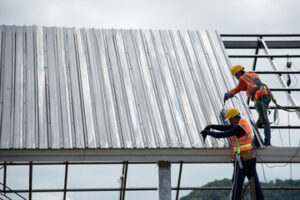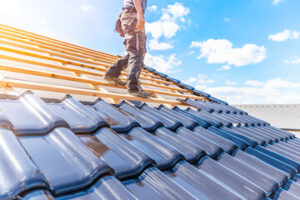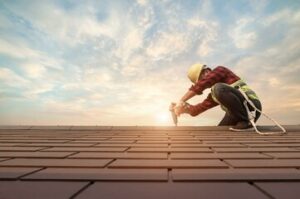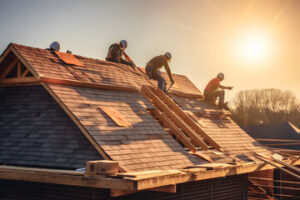Arthur’s Roofing is essential to the structural integrity of your home and plays a significant role in its energy efficiency and appearance. Changing weather conditions and advances in materials mean that roofs are subject to wear and tear over time.

Modern materials like asphalt shingles are reasonably priced, long-lasting and easy to install. Clay or concrete tiles add an aesthetic appeal while offering high protection against severe weather.
Roofing has been around as long as humans have needed shelter from the elements. Early civilizations built homes out of whatever materials were readily available, and this practical approach has stayed with humanity as we’ve evolved as a species.
As human beings grew more sophisticated, the need for shelter continued to grow as well. People wanted to be able to sleep at night without being exposed to rain, snow or other harsh weather conditions. Initially, this was accomplished by retreating into caves, but as the need for more extensive shelter arose, alternative forms of protection began to appear.
One of the earliest forms of roofing was thatched roofs made from bundles of grass, reeds or straw. These early roofs were easy to build and relatively affordable compared to wood or stone structures.
The ancient Greeks and Romans both made significant contributions to roofing techniques, including the use of clay tiles in their buildings. These were fired in kilns, making them sturdy and fire-resistant. They also interlocked with each other, which made them stronger and allowed for more elaborate architectural designs. The Romans even used their mastery of concrete to construct dome roofs, as seen at the Pantheon in Rome.
When the American colonies formed, many people turned to timber and wood shingles for their roofs. The shingles were made from locally available lumber, usually white pine in the East and cypress or oak in the South. These shingles were often layered and tarred for additional water resistance.
In the 1800s, manufacturing methods improved and tin-plated metals became popular for roofing. By this time, tar paper had replaced the earlier forms of water resistant shingles, and asbestos was becoming less desirable as health concerns arose.
The invention of the corrugated iron sheet roof in the mid-19th century marked a major advancement in roofing construction. This method of roofing boosted strength and durability while eliminating the need for sheathing or closely spaced framing. The ability to manufacture the sheets onsite also helped speed up assembly time.
Materials
Re-roofing a home is an opportunity to change its appearance and improve its resale value. Re-roofing can also affect the overall health and comfort of a home. Choosing the right roofing material is important. There are many different types of roofing materials on the market today. The most common is a shingle, but other roofs include asphalt shingles, clay tiles, concrete tiles, slate tiles, and even flat membrane roofing.
Asphalt shingles are cheap, easy to install, and long-lasting. They can withstand severe weather conditions, but they are vulnerable to punctures. Fortunately, puncture-resistant shingles are now available for asphalt shingles.
Slate shingles are beautiful and a good investment, lasting over 50 years for soft slate and up to 200 years for hard slate. They are fire-proof, naturally resistant to rain and snow, and can handle high winds. However, they are heavy and require special framing during installation.
A relatively new roofing material is rubber. It is available in both a single-ply membrane and a multi-ply membrane. Single-ply membranes are made from a mix of tar and rubber, making them suitable for flat roofs. Multi-ply membranes are made from several layers of a mixture of a synthetic resin and an adhesive. They are durable, inexpensive, and water-resistant, but they can release toxic fumes during the installation process and are not ideal for cold climates.
Stainless steel is another durable roofing material that is long-lasting and cost-effective. It can withstand harsh weather conditions, but is not as flexible as aluminum. It is not recommended for homes in cold climates, where the metal can become brittle or cracked.
Tile roofing is a beautiful option that can give a home a Mediterranean look. It is available in a wide variety of colors and styles, from mission-style to Spanish-style round-topped shingles. It is also available in flat styles for French and English-style homes. Tile is heavy, though, so it’s important to ensure your home can support its weight.
Membrane roofing is a popular choice for flat roofs because it is affordable and durable. It is made from EPDM (ethylene propylene diene monomer) or TPO (thermoplastic polyolefin). EPDM and TPO are glued together to form a sheet that can be installed on flat or low-pitched roofs. It can withstand the weight of heavy equipment and is easy to install, but it can leak if not properly maintained or if there are ponding areas.
Installation
A home’s roof serves as its primary barrier against the elements, preventing water damage and preserving the building’s interior. The roof is comprised of a number of components, including the fascia, which runs along the edge of the roof and attaches to the ends of the rafters or trusses. Whether replacing an existing roof or installing a new one, the process starts with a thorough inspection of the area to assess its condition. Roofing contractors typically remove the existing roof covering, which exposes the roof deck and allows for a more thorough inspection. This is a good time to inspect the condition of the joists, rafters and trusses for any signs of rot or damage. Then, they measure the length of each section to determine how much material is needed.
Maintenance
A building’s roof is its main protection from the elements. It should be inspected on a regular basis for signs of moisture damage, such as water stains and mold, rot, or leaks in ceilings and interior walls. It should also be inspected for structural damage like cracking, warping, or rust in beams and trusses.
Regular maintenance of a roofing system includes cleaning and inspection, repair, and replacement of shingles, flashing, and vent pipes. It also involves routine cleaning of gutters and downspouts to prevent clogs. In addition, it is important to verify the caulking around chimneys and vents is intact to prevent leaks.
It is also advisable to trim tree branches on a regular basis so they are not touching the roof. This will prevent them from breaking in heavy storms or during natural disasters. It is also a good idea to examine the soil underneath the trees on your property for any signs of root erosion, which can cause the ground to shift and damage your roof. It is important to keep in mind that some repairs or inspections may be beyond the scope of a homeowner’s abilities, and it is recommended to hire a professional for these services.


